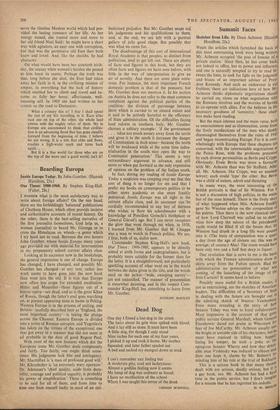Bearding Europa
I WONDER what is the most satisfactory way to write about foreign affairs? On the one hand, there are the forbiddingly 'balanced' publications of Chatham House, which often provide incisive and authoritative accounts of recent history. On the other, there is the best-selling narrative of the first journalist (sometimes, God help us, a woman journalist) to beard Mr. Gizenga or to cross the Himalayas on wheels—a genre which I try hard not to read. Between the two hovers John Gunther, whose Inside Europe many years ago provided me with material for interventions in my preparatory school current affairs class.
Looking at its successor now in the bookshops, the general impression is one of change. Europe has changed, 1 have changed, and possibly Mr. Gunther has changed—at any rate, rather less work seems to have gone into the new book than went into the old. It is true that Europe now offers less scope for extended meditation. Hitler and Mussolini—those figures out of a horror-opera—are dead, and so is the great Khan of Russia, though the latter's soul goes marching on, at present appearing most at home in Peking. Western Europe is in the process of uniting, and Britain—tactfully described here as 'England, the most important country'—is taking the plunge across the Channel. Eastern Europe is divided into a series of Russian satrapies, and Yugoslavia has taken on the virtues of the exceptional one that got away in a manner that did not seem at all probable in the days of good Regent Paul.
With most of the new features which dot the European scene Mr. Gunther deals competently and fairly. Too fairly, one might think some- times. His judgments lack bite and astringency. Mr. Macmillan is 'a man of profound good will.' Mr. Khrushchev is 'an extremely wary operator.' Dr. Adenauer's 'chief quality, aside froin dura- bility, courage and political sagacity, is probably his power of simplification.' There is something to be said for all of them, and from time to time one finds oneself badly in need of an old-
fashioned prejudice. But Mr. Gunther snaps out his judgments and his qualifications to them, and, at the end, we are left with a portrait gallery of jolly good chaps. But possibly that was what we came for.
The disadvantage of this sort of international Royal Academy is that peoples, as distinct from politicians, tend to get left out. There are plenty of facts and figures in this book, but they are often facts and figures we have seen before, with little in the way of interpretation to give an air of novelty. And there are some plain omis- sions. For instance, the most important French domestic problem is that of the peasants, but Mr. Gunther does not mention it. In his section on Austria he does not refer to the most common complaint against the political parties of the coalition: the division of patronage between them which is carried to an absurd extent and is said to be actively harmful to the efficiency of State administration. Of the difficulties facing land reform in southern Italy, Mr. Gunther chooses a solitary example : 'if the government . . takes too much money away from the north and gives it to the south it increases the danger of Communism in both areas—because the north will be weakened while at the same time indus- trialisation in the south may open the way to Communist penetration.' This seems a very extraordinary argument to advance, and still more so when put forward as the only expression of opinion on the problem of the Italian south.
In fact, during my reading of Inside Europe Today a suspicion was creeping over me that this sort of thing is no longer for me and that I prefer my books on contemporary politics to be either more academic or else more frankly polemical. Inside Europe was all right in the current affairs class, and its successor can be cordially recommended to any boy, of thirteen who wishes to floor his schoolmaster with a knowledge of President Gronchi's birthplace or General Gtirsel's age. But I can never recapture the glow that went through me when, in 1938, I learned from Mr. Gunther that M. Chiappe was a man to watch in French politics. We are, I fear, both of us, duller now.
Commander Stephen King-Hall's new book, Our Times: 1900-1960, appears to be directly aimed at sixth forms and undergraduates, but is probably more suitable for the former than for the latter. It is a straightforward, not particularly sparkling account of what went on in the world between the dates given in the title, and the words used on the jacket—`wide, sweeping survey'— are not unjustified. The manner of presentation is somewhat daunting, and in this respect Com- mander King-Hall has something to learn from Mr. Gunther.
ANTHONY HARTLEY






























 Previous page
Previous page